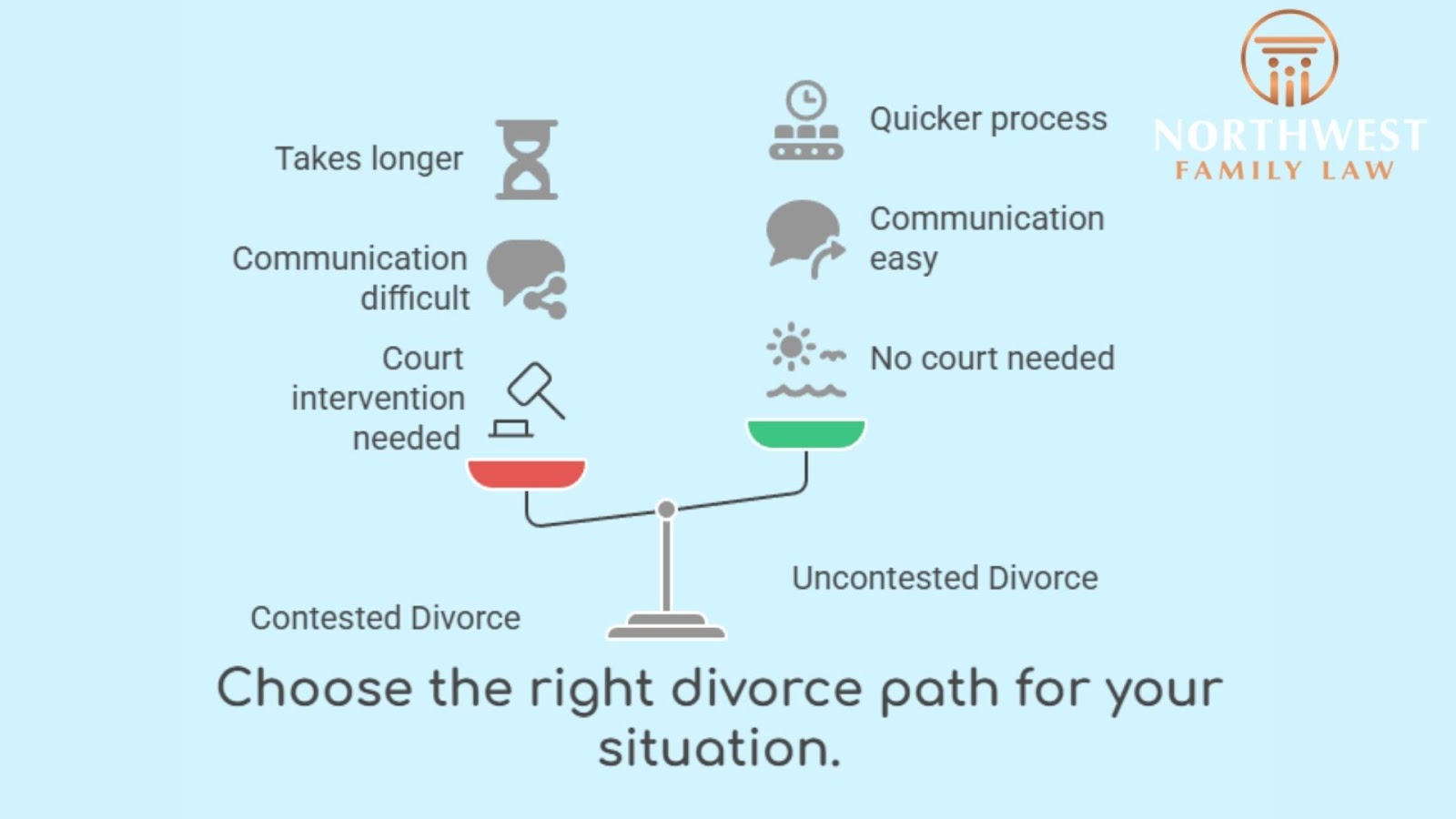Knowing the difference between contested and uncontested divorce can save you time, money, and unnecessary stress. The truth is, the path you choose can shape everything from how long the process takes to how much control you have over the outcome.
At Northwest Family Law, we’ve worked with people in every type of situation, from mutual decisions to high-conflict cases involving kids, finances, and everything in between. Our job isn’t just to handle paperwork, it’s to help you rebuild, step by step.
Key Takeaways
- Uncontested divorces are faster, cheaper, and less stressful when both parties agree on key issues like custody, property, and support.
- Contested divorces involve disagreements that often require court intervention, making them longer, more expensive, and emotionally taxing.
- Choosing the right divorce path depends on your situation, level of agreement, emotional readiness, and whether you feel safe and informed throughout the process.
What Is an Uncontested Divorce?
An uncontested divorce happens when both people agree on all the elements of a separation. Think child custody, how to split property, whether someone pays support, and how much.
Here’s what that usually means:
- No court fights
- Less paperwork
- Lower legal costs
- Fewer delays
- Less stress (for you and your kids)
Still, even in uncontested cases, it’s smart to double-check everything. One missed detail in the agreement can lead to headaches down the line.
How Much Does an Uncontested Divorce Cost?
Uncontested divorces are usually the most affordable option, and it’s a big reason why many people try to resolve things outside of court. The average cost of an uncontested divorce falls between $1,000 and $2,000.
If you and your spouse are on the same page, you can keep expenses low by filing jointly, handling your own paperwork, or using flat-fee legal services. Some people choose to go entirely without an attorney, though it’s still smart to have someone review your agreement to avoid future issues.
Filing fees, which vary by state, typically cost between $100 and $600, even for uncontested divorces.
What Is a Contested Divorce?
A contested divorce means you don’t agree on some or all of the major decisions. Meaning there are key disagreements about custody, money, or property. When there’s no clear middle ground, a judge has to step in.
That usually includes:
- Court hearings or even a full trial
- Lawyers negotiating or arguing on your behalf
- Higher costs from legal fees and court filings
- More stress and emotional toll
- Less control over the final outcome (because the court decides)
Some people start out thinking their divorce will be uncontested, only to realize certain issues are too complicated or emotional to resolve on their own. Others begin with a contested situation, then work things out through mediation or lawyer-assisted negotiations.
How Much Does a Contested Divorce Cost?
Contested divorces are more expensive, often significantly. The average cost ranges from $13,500 to $29,000, depending on how long the case lasts and how complicated the issues are.
Attorney fees make up the bulk of that cost. According to Nolo, legal fees alone average around $12,000 in contested cases. And because these divorces often involve court hearings, negotiations, and extended timelines, costs can rise quickly, especially if custody, property, or support are contested.
Even though filing fees are similar to uncontested divorces, the added time, legal work, and court involvement make contested divorces far more costly in the long run.
Quick Comparison: Which One Fits Your Situation?

This side-by-side breakdown shows how contested and uncontested divorces stack up in the areas that matter most.
| Concern | Contested Divorce | Uncontested Divorce |
| You disagree on child custody | You’ll likely need court intervention | Not the right path if there’s major disagreement |
| You want to avoid going to court | Court appearances are usually required | Often handled with paperwork and no formal hearing |
| You’re worried about being taken advantage of | Legal help protects your interests | Still smart to have a lawyer review your agreement |
| You and your ex communicate well | Tension and conflict often make this harder | Makes it easier to resolve things without a fight |
| You want to get it over with fast | Can take months (or longer) | Some finalize in as little as 30 days |
| You need to keep costs down | Legal fees and delays can add up quickly | Lower legal fees and less time mean smaller bills |
5 Questions to Help You Decide
Before you choose which path to take, ask yourself a few honest questions.
1. Do we agree on the big stuff?
Think about child custody, support payments, who keeps the house, and how debt gets handled. If you’re mostly aligned on these, an uncontested divorce is possible. But if even one of those topics is disagreed upon, you might need legal backup.
2. Am I emotionally ready to work directly with my ex?
Even if you agree on paper, communication is key. Can you have calm conversations, or do things spiral quickly? An uncontested divorce often means working together, at least enough to fill out forms and sign documents.
3. Do I feel safe and secure during this process?
This is about feeling protected, respected, and informed. If you’re unsure whether your ex is being honest or fair, a contested process gives you more oversight and legal protections.
4. Can I handle the paperwork, or do I want help?
Uncontested divorces still involve legal documents, deadlines, and local court rules. Some people are fine using online tools or self-help kits. Others would rather have a lawyer make sure nothing gets missed.
5. What kind of closure do I want?
Fast and cheap might sound good on paper, but peace of mind matters, too. If you’d rather take the longer route and feel fully heard, even if it means going to court, that’s valid. If you’re ready to move forward quickly and can agree on the terms, uncontested might be your answer.
What Does The Divorce Process Look Like?

Regardless of contested or uncontested, divorce follows a general process. But how that process feels, and how long it takes, can be very different depending on how much you and your ex agree on.
What Happens in an Uncontested Divorce
If you’re both on the same page, the legal part can be surprisingly straightforward. Here’s how it usually goes:
- One spouse files the initial divorce petition with the court.
- The other spouse is served (formally notified) and signs an agreement.
- You both submit a signed settlement that covers custody, property, support, and anything else.
- The court reviews your paperwork.
- A judge finalizes the divorce, sometimes without either of you having to appear in court.
What Happens in a Contested Divorce
If there’s disagreement, the process takes longer and includes more steps:
- One spouse files for divorce and outlines what they want.
- The other spouse responds, often disagreeing with parts of the request.
- Both sides exchange documents like financials, evidence, anything relevant.
- Negotiations or mediation might happen to try settling without court.
- If no agreement is reached, the case goes to trial.
- A judge decides on all unresolved issues.
When It’s Time to Hire a Lawyer
The right choice depends on how complicated your situation is, and how confident you feel about handling it alone.
Signs You Should Hire a Lawyer
If any of these feel familiar, it’s probably worth getting legal support:
- You’re not sure what you’re entitled to, financially or legally
- Your spouse already has a lawyer
- There’s disagreement about child custody or visitation
- You’re worried your ex isn’t being honest about money or assets
- You feel overwhelmed by the forms, deadlines, or court process
- You’re worried about being manipulated or pressured
Even in an uncontested divorce, a lawyer can still review your agreement and spot red flags you might miss.
Financial Options for Hiring a Lawyer
Legal help doesn’t always mean thousands of dollars. Some lawyers offer:
- Flat-fee services for uncontested divorces
- One-time consultations to review your paperwork
- Sliding scale pricing based on income
- Mediation support, which is often cheaper than going to court
You don’t have to commit to a full legal battle to get solid advice. Sometimes, one conversation with a professional can make the rest of the process smootherand save you from costly mistakes later.
Frequently Asked Questions
Q: Can we still file uncontested if we don’t agree on everything?
No. You must agree on everything, custody, support, property, debt. If you don’t, it’s contested.
Q: Does a judge still have to approve an uncontested divorce?
Yes. Even if you agree on everything, a judge has to sign off, especially if kids are involved.
Q: What if my spouse changes their mind halfway?
Then it becomes contested. You’ll need to resolve the disagreement or go to court.
Q: Do we both need lawyers for uncontested divorce?
No, but it helps. At least one of you should get a lawyer to review the agreement.
Ready to Make a Clear, Confident Decision?
Divorce is a major life decision. Understanding your options is the first step toward a smoother process.
At Northwest Family Law, we offer more than legal support. We take a personalized, compassionate approach that helps you move forward with clarity and confidence, backed by a team that’s here for the whole journey.
If you’re ready to talk through what’s right for you, get in touch to schedule a consultation.

